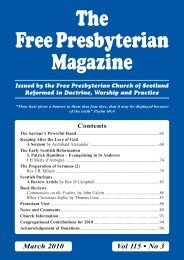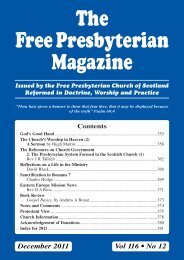May - the Free Presbyterian church of Scotland
May - the Free Presbyterian church of Scotland
May - the Free Presbyterian church of Scotland
You also want an ePaper? Increase the reach of your titles
YUMPU automatically turns print PDFs into web optimized ePapers that Google loves.
130<br />
The <strong>Free</strong> <strong>Presbyterian</strong> Magazine<br />
It seemed such a small point on which Satan tempted Eve, to take just one<br />
piece <strong>of</strong> fruit, but “whosoever shall keep <strong>the</strong> whole law, and yet <strong>of</strong>fend in<br />
one point, he is guilty <strong>of</strong> all” (Jas 2:10). When Eve transgressed God’s command<br />
at this one point, she was a law-breaker, and this one point was what<br />
she and Adam had been particularly warned about; <strong>the</strong> all-wise God had<br />
appointed it as a test <strong>of</strong> whe<strong>the</strong>r <strong>the</strong>ir love <strong>of</strong> righteousness would endure.<br />
Satan and his followers do all in <strong>the</strong>ir power to prevent sinners from forsaking<br />
wickedness and returning to God; “<strong>the</strong> god <strong>of</strong> this world hath blinded<br />
<strong>the</strong> minds <strong>of</strong> <strong>the</strong>m which believe not, lest <strong>the</strong> light <strong>of</strong> <strong>the</strong> glorious gospel <strong>of</strong><br />
Christ, who is <strong>the</strong> image <strong>of</strong> God, should shine unto <strong>the</strong>m” (2 Cor 4:4). Correspondingly<br />
sinners have no desire to lay hold <strong>of</strong> Christ’s righteousness,<br />
however warmly it is set before <strong>the</strong>m and however earnestly <strong>the</strong>y are warned<br />
against <strong>the</strong> sin <strong>of</strong> unbelief. Even apart from <strong>the</strong> evil activity <strong>of</strong> <strong>the</strong> devil,<br />
sinners will go on in sin ra<strong>the</strong>r than walk in <strong>the</strong> way <strong>of</strong> holiness – unless and<br />
until <strong>the</strong> Holy Spirit will work savingly in <strong>the</strong>ir hearts.<br />
Jesus grew up in a sinful environment. His was a godly family, yet nei<strong>the</strong>r<br />
Joseph or Mary were free from sin. Fur<strong>the</strong>r, we are told that “nei<strong>the</strong>r did His<br />
brethren believe in Him” (Jn 7:5); <strong>the</strong>y were still in <strong>the</strong>ir sins, and we can<br />
assume that this was <strong>the</strong> condition also <strong>of</strong> almost everyone around Him as<br />
He grew up in Nazareth. Certainly <strong>the</strong> reaction <strong>of</strong> <strong>the</strong> local people to Jesus’<br />
address in <strong>the</strong>ir synagogue was <strong>the</strong> reverse <strong>of</strong> what we would expect from<br />
a godly community (and behind this ungodly reaction, we can readily recognise<br />
<strong>the</strong> evil influence <strong>of</strong> <strong>the</strong> tempter: his hatred <strong>of</strong> righteousness and love<br />
<strong>of</strong> wickedness). Yet in His childhood “Jesus increased . . . in favour with God”<br />
(Lk 2:52); it was evident that He loved righteousness, and hated wickedness.<br />
And <strong>the</strong> all-seeing eye <strong>of</strong> His Fa<strong>the</strong>r observed this.<br />
Satan had been successful in tempting holy Adam and Eve in <strong>the</strong> Garden<br />
<strong>of</strong> Eden, and he could not resist tempting <strong>the</strong> holy God-man. There was <strong>the</strong><br />
particular confrontation immediately after <strong>the</strong> baptism <strong>of</strong> Christ, at His entrance<br />
to His public ministry – when <strong>the</strong> Saviour showed His love <strong>of</strong> what<br />
is right by insisting to John: “Thus it becometh us to fulfil all righteousness”<br />
(Mt 3:15). Yet we should note that <strong>the</strong> Saviour went out deliberately to confront<br />
Satan – “led by <strong>the</strong> Spirit” – for to “resist <strong>the</strong> devil” was an element <strong>of</strong><br />
<strong>the</strong> work that had been entrusted to Him for <strong>the</strong> redemption <strong>of</strong> His people.<br />
His love to righteousness and hatred <strong>of</strong> wickedness was manifest as Christ<br />
forcefully rejected Satan’s temptation, even when that enemy <strong>of</strong> all righteousness<br />
quoted from <strong>the</strong> Scriptures. Even after being twice repulsed with “<strong>the</strong><br />
sword <strong>of</strong> <strong>the</strong> Spirit, which is <strong>the</strong> Word <strong>of</strong> God” (Eph 6:17), Satan returned<br />
a third time to tempt <strong>the</strong> Saviour. Having shown Him “all <strong>the</strong> kingdoms <strong>of</strong><br />
<strong>the</strong> world, and <strong>the</strong> glory <strong>of</strong> <strong>the</strong>m”, Satan made <strong>the</strong> <strong>of</strong>fer: “All <strong>the</strong>se things

















